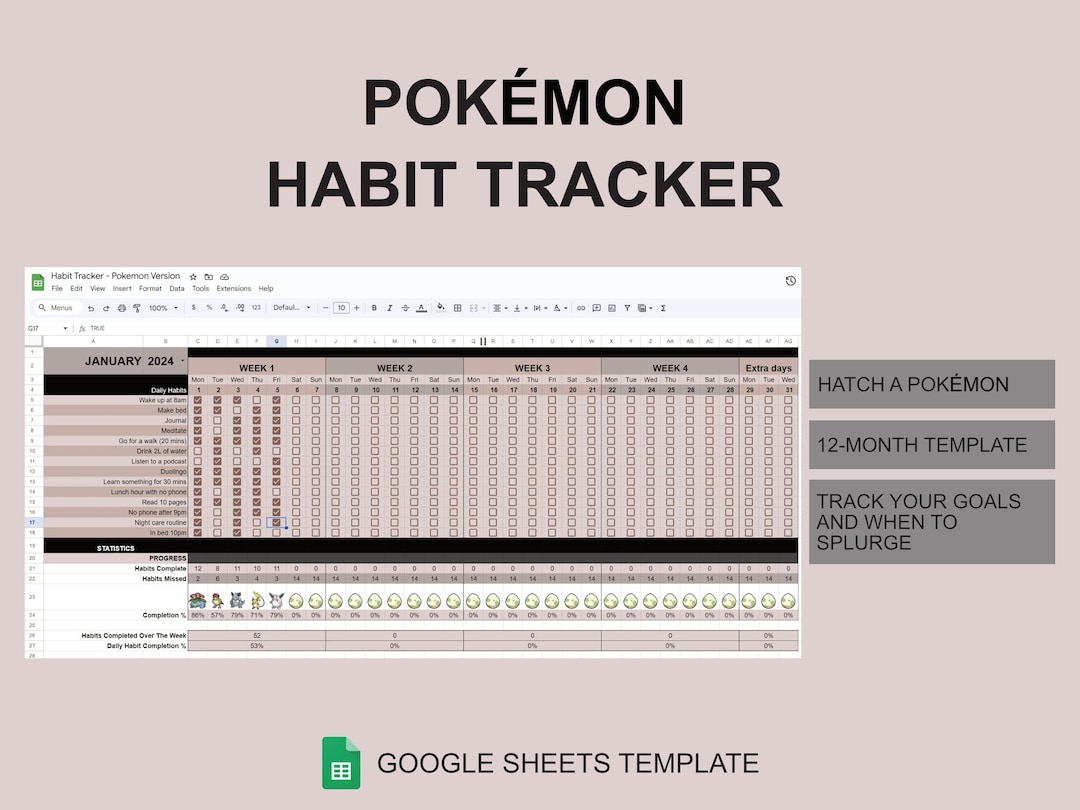For over two decades, the world of Pokémon has captivated millions, evolving from simple pixelated creatures on a monochrome screen to a sprawling universe of games, cards, and animated adventures. As the franchise grew, so did the complexity of managing one's collection, tracking progress, and strategizing for battles. This is where the ingenious concept of a Pokemon Pocket Spreadsheet emerges as an indispensable tool for trainers, collectors, and competitive players alike.
Whether you're aiming to complete your Pokedex, optimize your competitive team, or simply keep tabs on your cherished collection, a well-organized digital companion can make all the difference. Gone are the days of scribbled notes and forgotten details; with a pocket spreadsheet, all your vital Pokémon data is at your fingertips, empowering you to become the very best, like no one ever was.
Table of Contents
- Introduction to the Pokemon Pocket Spreadsheet
- Why Every Trainer Needs a Pokemon Pocket Spreadsheet
- Building Your Ultimate Pokemon Pocket Spreadsheet: Key Categories
- Tools and Platforms for Your Pocket Spreadsheet
- Advanced Techniques: Beyond the Basics with Your Spreadsheet
- The Community Value of Data: Sharing and Collaboration
- The Longevity and Legacy of Pokémon: 20 Years and Beyond
- Future-Proofing Your Pokémon Data
- Conclusion: Your Journey, Optimized
Introduction to the Pokemon Pocket Spreadsheet
The term "Pokemon Pocket Spreadsheet" might sound like a mouthful, but it perfectly encapsulates a powerful concept: a portable, digital database for all your Pokémon-related information. Imagine having a comprehensive record of every Pokémon you own, its stats, abilities, moves, IVs/EVs, location caught, and even its sentimental value, all accessible on your smartphone or tablet. This isn't just about listing names; it's about creating a dynamic system that helps you make informed decisions, track progress, and truly master the vast world of Pokémon. From the earliest days of Red and Blue to the expansive regions of Paldea, the sheer volume of data involved in being a dedicated trainer has grown exponentially. A pocket spreadsheet is the modern trainer's equivalent of a meticulously organized Pokédex, but with the added power of customizability and analytical capabilities.
Why Every Trainer Needs a Pokemon Pocket Spreadsheet
In a game where every stat point, ability, and move matters, relying solely on in-game menus can be cumbersome and inefficient. A Pokemon Pocket Spreadsheet provides a centralized hub for critical data, offering unparalleled advantages that elevate your gameplay from casual to truly strategic:
- Comprehensive Overview: See your entire collection at a glance, identify gaps in your Pokédex, and plan your next captures or breeding projects with precision. No more wondering if you have that specific hidden ability Pokémon.
- Strategic Advantage: Meticulously track Individual Values (IVs), Effort Values (EVs), natures, and optimal move sets for your competitive Pokémon. This allows for precise team building, ensuring every member of your squad is optimized for its role, leading to more consistent victories in online battles or local tournaments.
- Efficient Resource Management: Keep tabs on valuable in-game items like TMs, TRs, rare candies, berries, and even specific breeding pairs. This ensures you never waste precious resources and always know what you have on hand for evolving, training, or crafting.
- Collection Value Tracking: For serious collectors, especially those dealing with rare trading cards, vintage games, or unique merchandise, a spreadsheet can become an invaluable asset. It helps track acquisition dates, condition, and estimated market value. For instance, knowing the current market value of an "Original Gameboy with Pokémon Pikachu game (Bakersfield) for $200" is crucial for serious collectors, and a dedicated sheet within your pocket spreadsheet can log such details, along with photos or links to online listings.
- Personalized Progress Tracking: Monitor your progress towards specific, self-imposed goals. Whether it's completing the National Pokédex across multiple generations, achieving a certain battle rank in the competitive ladder, or simply evolving every Pokémon in a specific region, a spreadsheet provides a clear, visual representation of your achievements.
- Nostalgia and History: Beyond its practical utility, a Pokemon Pocket Spreadsheet serves as a personal journal of your Pokémon journey. It's a living document that captures the essence of your dedication, a testament to the "20 years" of support and passion for the franchise. You can look back at when and where you caught your first shiny, or the specific team that carried you to victory in a tough challenge.
Building Your Ultimate Pokemon Pocket Spreadsheet: Key Categories
Creating an effective Pokemon Pocket Spreadsheet requires thoughtful planning and a clear understanding of what data is most important to you. The beauty of a spreadsheet is its customizability; you can tailor it precisely to your needs. Here are essential categories and sub-sections to consider when designing your ultimate Pokémon data hub:
Collection Tracking: Catch 'Em All, Track 'Em All
This is often the starting point for many trainers, whether they're aiming for a living Pokédex or simply want to know what they've amassed. A robust collection tracker ensures you know exactly what you have and what you need to acquire. Consider these essential columns for each Pokémon:
- Pokémon Name: The basic identifier, e.g., "Pikachu," "Charizard."
- National Dex Number: For easy sorting and comprehensive Pokédex completion tracking across generations.
- Form/Variant: Crucial for Pokémon with multiple forms (e.g., Alolan, Galarian, Hisuian forms, or different gender/size variants like Gastrodon or Basculin).
- Location Caught/Acquired: Useful for sentimental value, Nuzlocke challenge tracking, or specific game tracking (e.g., "Route 1, Kanto," "Max Raid Battle").
- Date Caught/Acquired: A timestamp for your journey, allowing you to reminisce about your captures.
- Level/Evolution Stage: Current level and whether it's fully evolved, or what stage it's at.
- Nature: Critical for understanding stat growth and competitive viability.
- Ability: Which ability it possesses (especially important for hidden abilities or specific battle strategies).
- Held Item: What item it's currently holding in-game.
- Pokeball: The specific type of ball it was caught in (for aesthetics, collection challenges, or specific lore).
- Shiny Status: A simple Yes/No indicator for quick identification of your rare finds.
- Gender: For breeding purposes or specific abilities/evolutions.
- IVs (Individual Values): Often represented as 31/31/31/31/31/31 for perfect, or specific numbers for each stat (HP, Atk, Def, Sp. Atk, Sp. Def, Speed).
- Notes: Any personal notes, like "good for trading," "needs EV training," "nicknamed Sparky," or "sentimental value."
- Source Game: Which specific game version it resides in (e.g., "Sword," "Shield," "Pokémon Go," "Home").
For collectors of physical items, like the "Original Gameboy with Pokémon Pikachu game (Bakersfield) $200" or other memorabilia, separate sheets within your Pokemon Pocket Spreadsheet can track:
- Item Name: e.g., "Pokémon Red Cartridge," "Charizard Base Set 1st Edition," "Pikachu Plush."
- Acquisition Date: When and where you obtained it.
- Condition: Mint, Near Mint, Played, Damaged, etc., often with a numerical rating.
- Estimated Value: Current market value, which can be updated periodically.
- Source/Seller: Where you acquired it from (e.g., "eBay," "local game store," "friend").
- Notes: Any unique identifiers, serial numbers, or specific details about the item.
Competitive Battling: Data-Driven Dominance
For competitive players, a Pokemon Pocket Spreadsheet is a non-negotiable tool. It allows for meticulous planning, optimization, and analysis of teams and individual Pokémon. This level of detail is what separates casual players from true strategists. Key data points for competitive Pokémon include:
- Pokémon Name: The core identifier for the Pokémon on your team.
- Role: Clearly define its purpose on the team (e.g., "Physical Sweeper," "Special Wall," "Support," "Hazard Setter," "Trick Room Setter").



Detail Author:
- Name : Silas Gottlieb
- Username : reuben.kunze
- Email : adele.bogan@yahoo.com
- Birthdate : 1996-04-09
- Address : 3719 Ebony Harbor Apt. 602 Port Milesshire, ND 84591-3569
- Phone : 571-558-0076
- Company : Ullrich, Kohler and Schultz
- Job : Zoologists OR Wildlife Biologist
- Bio : Ut molestias perferendis id minus aut non. Recusandae ut sit sit aperiam quis reprehenderit. Aut ut animi voluptatem sequi vero odio rerum deserunt. Sunt quo deleniti adipisci cum.
Socials
tiktok:
- url : https://tiktok.com/@rolfson1988
- username : rolfson1988
- bio : Nihil expedita consequatur maxime eum voluptatem ut.
- followers : 1967
- following : 194
linkedin:
- url : https://linkedin.com/in/elvis_id
- username : elvis_id
- bio : Aliquid velit omnis culpa illo tempora ut.
- followers : 6642
- following : 1793
instagram:
- url : https://instagram.com/elvis.rolfson
- username : elvis.rolfson
- bio : Ut dolore sunt ex maiores sed aliquam. Beatae quia provident laboriosam facere alias.
- followers : 5366
- following : 2082
twitter:
- url : https://twitter.com/rolfson1997
- username : rolfson1997
- bio : Consequatur magni ex impedit voluptas. Quia nemo quae sequi. Mollitia unde ea delectus aperiam quod quibusdam voluptas.
- followers : 5551
- following : 2700